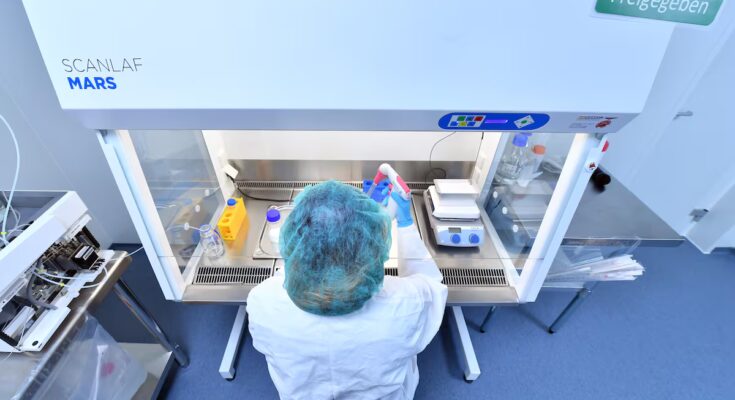Three internal reports from the regional government of Andalusia warn that there are patients with multiple myeloma, a type of cancer that originates in the plasma cells of the bone marrow, suffering from delays in access to an innovative CAR-T therapy in this community, which is shortening patients’ life expectancy.
“The delay in the availability of treatment is already having a negative impact on their expectations of response to therapy and, therefore, on their survival.” It is the categorical sentence, highlighted in bold, with which the head of the Hematology service of the Virgen del Rocío Hospital, José Antonio Pérez Olmo, closes the third of the reports to which EL PAÍS has had access. This last document, which includes 11 patients (out of a total of 23), is the one in which the doctor appears most urgent to his superiors to speed up the arrival of the drug to the patients.
Virgen del Rocío is one of three hospitals accredited in Andalusia – together with the Reina Sofía of Córdoba and the Regional of Málaga – to administer CAR-T therapies against multiple myeloma and the one with the greatest experience in this community in its use and research.
The treatment referenced in the reports is Carvykti, a CAR-T that has demonstrated excellent results in multiple myeloma patients who have relapsed after receiving other prior therapies. This type of cancer is still considered incurable, although therapeutic advances have managed to control it in many cases, with long periods of remission of several years in which patients enjoy a good quality of life.
Carvykti is the therapy that has contributed the most to these improvements, according to the results obtained in clinical trials and in the real world (patients treated after the release of the drug on the market). Thanks to it, about half of people with previous treatment failures remain disease-free after three years, while the average survival in this group was previously less than a year.
The Inter-Ministerial Commission on Medicine Prices (CIPM) decided last February to incorporate Carvykti into public healthcare from 1 April. It is from this date that the autonomous communities had to process the purchase of the drug with the pharmaceutical company Janssen through a sort of framework agreement. Because these procedures last several months, communities resort to the emergency route until they sign up to acquire therapies for patients who cannot wait.
The reports to which this newspaper has had access are part of these files and illustrate well the growing impatience of clinical leaders with delays. The first, which includes four patients, was signed by Pérez Simón just three weeks after the therapy was introduced into public health, on April 23, so it contains no explicit references to delays.
The document insists on the urgency of the cases: «Emergency treatment is requested, necessary due to the situation of serious danger in which the patient’s life finds itself». The document highlights that the Ministry of Health authorized the administration of the drug because all patients meet the requirements for public financing.
The second report is dated June 9 and includes eight patients aged between 44 and 73. The doctors’ discomfort due to the delay in administering the therapy is already starting to be evident, which is highlighted in two cases.
One states that “lymphocyte apheresis has been postponed several times because the financing procedure” for the drug between the Andalusian government and Janssen has not been approved. Apheresis, a key moment in CAR-T therapies, is the extraction of cells from the patient’s immune system so that they can be rescheduled with the aim of attacking the tumor cells themselves. The delays in apheresis occur despite the fact that Carvykti “is currently the best therapeutic option for achieving a response and making it long-lasting,” according to the report.
As for another patient, the document highlights that he “currently has a high tumor burden” and that, although CAR-T is overdue, he has undergone “bridging therapy” with conventional drugs. However, this treatment had to be suspended due to an adverse reaction to the drugs. The bottom line is that “delaying receipt of CAR-T therapy poses a risk to the management of high-risk multiple myeloma.”
The third report is the most convincing. Signed on August 6 – more than four months after Carvykti was included in public health – it includes 11 patients aged between 50 and 73, and in all cases insists on the existence of delays and the risk this poses to patients’ lives. As in the first two, Pérez Simón emphasizes that the patients received approval from the Ministry of Health.
“Very high risk”
On five occasions, the report states, “lymphocyte apheresis was postponed on several occasions because the purchase contract for the drug had not been approved”. This has forced doctors to resort to “bridging therapies”, which in one case mean “a decrease in disease-free survival expectations of around 20% in the first two years” and in the other four these expectations are reduced “from more than 40 months to around 34”.
In a sixth case, the document criticizes that “the delay in the availability of treatment implies the development of organic damage due to the progression of myeloma”. In another, delay “presents a very high risk of not being able to control the progression of high-risk multiple myeloma.”
A situation that goes further in another patient, in which the delay in receiving therapy “extremely hinders the possibility of controlling the disease (which represents a) high risk of having a negative impact on their survival”.
Another warning doctors give in reports is that if patients don’t receive Carvykti in time, the disease will continue to progress until they can no longer benefit from the therapy. “The delay in treatment availability is causing multiple myeloma to progress even during bridging treatment, increasing the risk of missing the opportunity to receive (Carvykti) due to clinical deterioration.”
The Council refused to evaluate the delays described in the reports. A spokesperson explains that emergency procedures have been put in place “to speed up” the purchase of the therapy and specifies that, to date, 15 patients have received it. On August 6, the date of the last report in which the delays were revealed, there were 23 patients waiting for Carvykti.
The emergency procurement files and, consequently, the delays that occurred in their management, are known to senior officials of the Andalusian government. The documents they contain are signed by the director of the Virgen del Rocío Hospital, Nieves Romero; the director of the Provincial Purchasing Center of Seville, Salud Rivero; and the Deputy Minister of Health, María Luisa del Moral, among others.
The reports also reached the Regional Government Council, chaired by Juan Manuel Moreno Bonilla. The emergency route, provided for by the Law on public sector contracts, provides that the purchase can be made without waiting for the approval of the Regional Council, but the latter must be informed and give its approval at the end of the entire procedure. This is what happened in the three cases in the meetings of the Andalusian Executive held on 18 June, 4 August and last 8 October.


